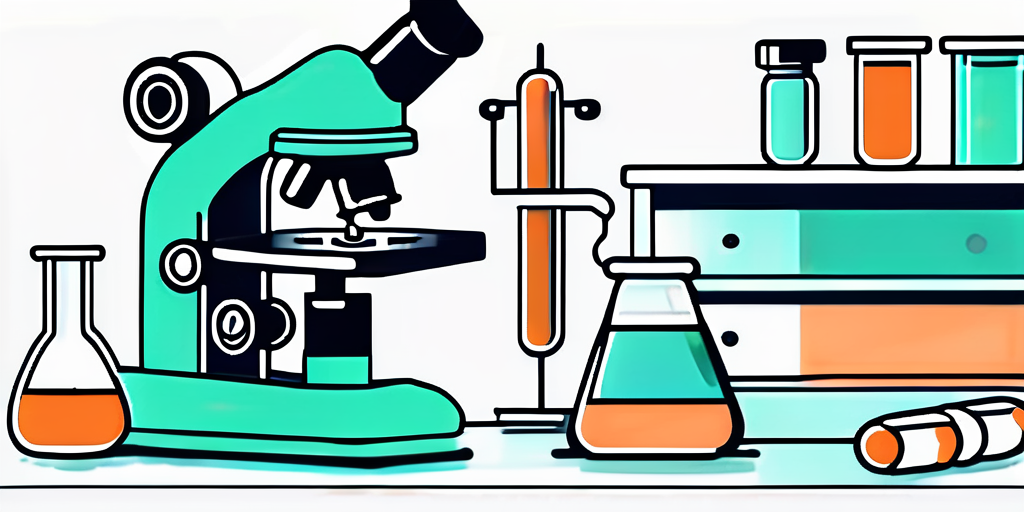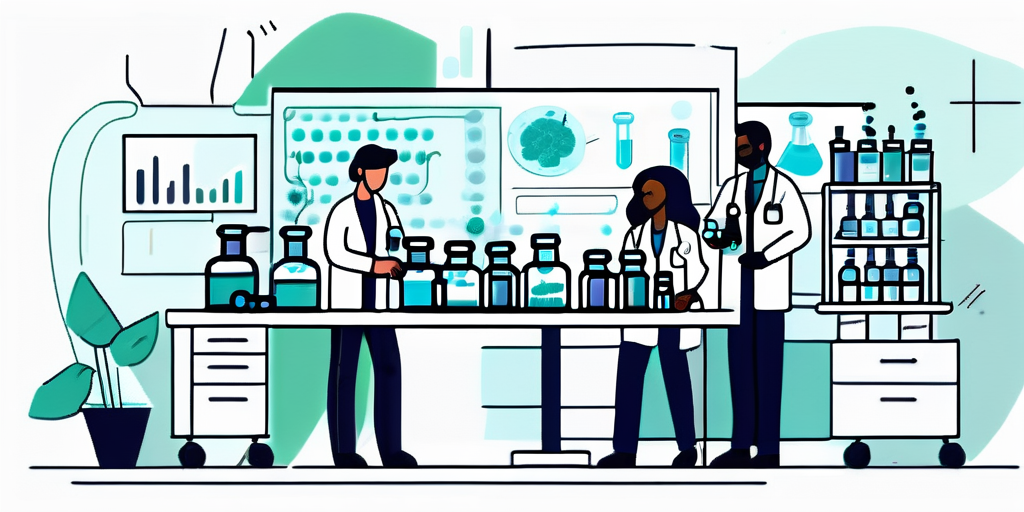Quick CV Dropoff
Send us your CV

If you're looking for a rewarding career in the pharmaceutical industry, quality assurance (QA) could be the perfect fit for you. As the field continues to evolve and grow, there is an increasing demand for skilled QA professionals who can ensure that pharmaceutical products meet the highest standards of quality and safety. In this article, we will explore the top jobs for QA in the pharmaceutical industry, the skills and qualifications required for these roles, as well as the career path and progression opportunities available.
Before diving into the various job opportunities, it is essential to understand the fundamental role of QA in the pharmaceutical industry. Quality assurance is a critical function that ensures pharmaceutical products are developed, manufactured, and distributed in compliance with regulatory requirements and industry standards. The primary goal of QA is to safeguard patient safety and ensure product efficacy.

When it comes to pharmaceuticals, quality is of utmost importance. QA plays a vital role in ensuring that drugs and medical devices meet the necessary quality standards. By conducting rigorous inspections, audits, and testing processes, QA professionals help safeguard public health and maintain the reputation of pharmaceutical companies.
QA professionals are responsible for a range of critical tasks, including developing and implementing quality systems, conducting risk assessments, and ensuring compliance with regulatory guidelines. They also play a crucial role in the validation of manufacturing processes and the review of documentation related to product safety and efficacy.
One of the key responsibilities of QA professionals is to perform thorough investigations in the event of any quality issues or non-compliance. This involves analyzing data, conducting root cause analysis, and implementing corrective and preventive actions to prevent recurrence. By identifying and addressing any potential quality issues, QA professionals help maintain the integrity of the pharmaceutical products and ensure that they meet the highest standards of quality.
In addition to their investigative role, QA professionals also play a crucial role in continuous improvement. They actively participate in process improvement initiatives, working closely with cross-functional teams to identify areas for enhancement and implement best practices. By constantly striving for improvement, QA professionals contribute to the overall efficiency and effectiveness of the pharmaceutical manufacturing processes.
In the fast-paced and highly regulated pharmaceutical industry, there are various types of QA job roles that professionals can pursue. These roles play a crucial role in ensuring that pharmaceutical products meet the highest standards of quality and safety. Let's take a closer look at some of the most common positions:

A QA analyst is a meticulous professional who is responsible for performing inspections and quality checks on pharmaceutical products. They meticulously examine every aspect of the product, from its ingredients to its packaging, to ensure compliance with regulatory standards. With their keen eye for detail, they analyze data and identify trends to continuously improve quality systems and procedures. This helps pharmaceutical companies maintain their reputation for producing safe and effective products that positively impact the lives of patients.
A QA engineer is a technical expert who focuses on the development and implementation of quality control processes. They work closely with cross-functional teams to design and conduct tests that evaluate the performance, reliability, and safety of pharmaceutical products. These tests involve rigorous analysis and experimentation to ensure that the products meet the highest quality standards. By leveraging their technical expertise, QA engineers contribute to the continuous improvement of manufacturing processes, helping pharmaceutical companies deliver products that consistently meet the needs of patients and healthcare professionals.
A QA manager is a seasoned professional who oversees all quality control and assurance activities within a pharmaceutical company. They play a critical role in developing and implementing quality strategies that align with the company's goals and objectives. With their extensive knowledge of regulatory requirements, they ensure that the company complies with all necessary regulations and guidelines. QA managers also lead quality improvement initiatives, working closely with cross-functional teams to identify areas for enhancement and implement effective solutions. Their leadership and expertise contribute to the overall success of the company by fostering a culture of quality and continuous improvement.
These are just a few examples of the diverse QA job roles available in the pharmaceutical industry. Each role requires a unique skill set and level of expertise, but all share a common goal: to ensure that pharmaceutical products are safe, effective, and of the highest quality. By working diligently in their respective positions, QA professionals contribute to the advancement of healthcare and the well-being of patients worldwide.
While the specific skills and qualifications required may vary depending on the job role and company, there are some essential requirements for QA professionals in the pharmaceutical industry.
In addition to the educational background, there are several other skills and qualifications that can greatly enhance a QA professional's ability to excel in their role.
A bachelor's degree in a relevant scientific field, such as pharmacy, chemistry, or biology, is typically required for entry-level QA positions. Higher-level roles may require advanced degrees or specialized certifications.
However, it is important to note that while a formal education provides a strong foundation, practical experience and continuous learning are equally important in the field of QA. Professionals who actively seek opportunities to expand their knowledge and stay updated with the latest industry trends are often more successful in their careers.
Attention to detail, strong analytical and problem-solving skills, excellent communication abilities, and a deep understanding of regulatory guidelines are all crucial for success in QA roles. Additionally, familiarity with quality management systems and experience in conducting audits and inspections are highly valued.
Moreover, QA professionals should possess a high level of adaptability and the ability to work effectively in a fast-paced and dynamic environment. They must be able to quickly identify and address issues, make informed decisions, and collaborate with cross-functional teams to ensure quality standards are met.
Furthermore, having a strong sense of ethics and integrity is essential for QA professionals, as they play a critical role in ensuring the safety and efficacy of pharmaceutical products. They must adhere to strict ethical guidelines and maintain a high level of professionalism in their work.
QA offers a promising career path with numerous opportunities for professional growth and advancement.
For those starting their career in QA, entry-level positions such as QA analyst or quality associate are common. These roles provide an excellent foundation for building practical experience and gaining a comprehensive understanding of quality assurance processes.
As QA professionals gain experience and expertise, they can advance to mid-level positions such as QA specialist or senior QA analyst. These roles involve more complex responsibilities, including leading validation projects, mentoring junior team members, and implementing quality improvement initiatives.
At the senior level, QA professionals can take on leadership positions such as QA manager or quality director. In these roles, they are responsible for overseeing the entire quality management system, ensuring compliance with regulatory requirements, and driving continuous improvement efforts.
The salary range for QA jobs in the pharmaceutical industry can vary depending on factors such as experience, education, and job location. Let's take a closer look at the key factors influencing salary and the average salary range for QA professionals.
Factors such as job level, industry experience, geographic location, and educational qualifications can all impact salary levels for QA professionals. Advanced degrees, specialized certifications, and managerial roles often command higher salaries.
While salary ranges can fluctuate, QA professionals in the pharmaceutical industry can expect competitive compensation packages. Entry-level positions typically range from $45,000 to $60,000 per year, while mid-level positions can earn between $70,000 and $90,000 annually. Senior-level QA professionals, such as QA managers, can earn salaries upwards of $100,000 per year.
In conclusion, QA offers a wide range of exciting job opportunities in the pharmaceutical industry. As a QA professional, you can play a crucial role in ensuring the safety, efficacy, and quality of pharmaceutical products. Equip yourself with the right skills, qualifications, and experience to carve out a successful career path in QA. Let's work together to shape the future of pharmaceutical quality and make a lasting impact in this vital industry. Reach out today to begin your journey towards professional fulfillment!